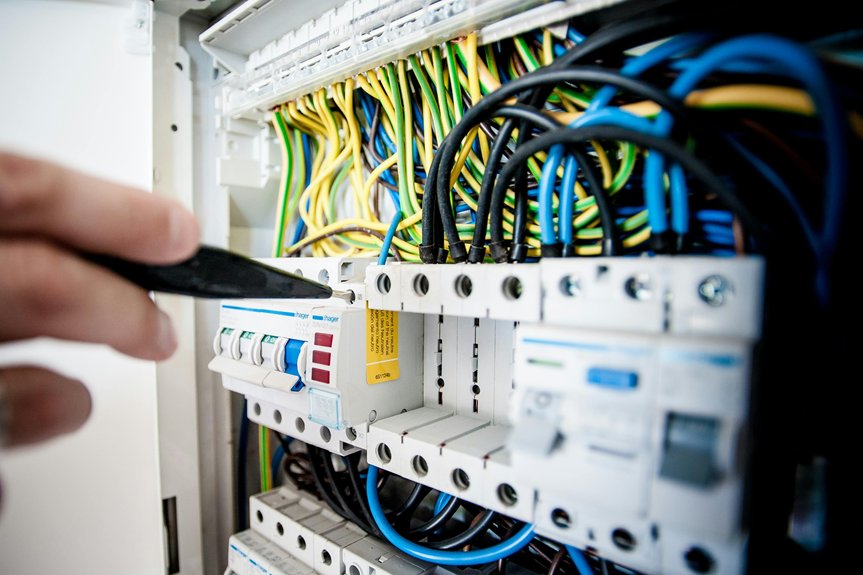Maintaining your home water system is crucial for both efficiency and health. Regular inspections of your plumbing can help you catch leaks and clogs before they escalate. It’s also important to test your water filters periodically to guarantee clean drinking water. What other steps can you take to keep your system running smoothly and avoid costly repairs? Let’s explore the essential tips that can help you achieve the best water system performance.
Key Takeaways
- Regularly inspect plumbing for leaks, corrosion, and moisture to prevent damage and ensure efficient water flow.
- Test and replace water filters based on a maintenance schedule to improve water quality and system longevity.
- Monitor water pressure and temperature regularly to maintain optimal performance and prevent system strain.
- Schedule annual water heater maintenance to check for sediment buildup, corrosion, and ensure proper functionality.
- Address leaks promptly with appropriate sealants or professional repairs to conserve water and avoid costly damages.
Regularly Inspect and Clean Your Plumbing

To guarantee your home water system functions efficiently, regularly inspecting and cleaning your plumbing is essential.
Start by checking for signs of pipe corrosion, which can lead to leaks and decreased water quality. Use a flashlight to inspect under sinks and behind appliances for any discoloration or moisture.
Additionally, address drain clogs promptly, as they can cause backups and damage your plumbing system. Use a plunger or a drain snake to clear minor blockages, and consider professional cleaning for persistent clogs.
Maintaining your plumbing not only guarantees ideal water flow but also extends the life of your system.
Test and Replace Water Filters Periodically
While maintaining your home water system, testing and replacing water filters periodically is essential for ensuring clean and safe drinking water.
Each filter has a specific filter lifespan, which can vary based on usage and water quality. To keep your water safe, establish a maintenance schedule that includes testing your filters every few months.
Each filter has a unique lifespan; regular testing every few months ensures safe and clean water.
If you notice a decrease in water flow or an unusual taste, it’s time to replace the filter. Regularly replacing filters not only improves water quality but also extends the life of your water system.
Prioritize this task to safeguard your health and enhance your water experience.
Monitor Water Pressure and Temperature
Monitoring water pressure and temperature is essential for maintaining an efficient home water system. Pressure fluctuations can lead to pipe damage or reduced appliance efficiency, while temperature extremes can affect water quality. Regular checks help you identify issues early.
| Measurement | Ideal Range |
|---|---|
| Water Pressure | 40-60 psi |
| Cold Water Temp | 50-60°F |
| Hot Water Temp | 120-140°F |
| Maximum Pressure | 80 psi |
| Minimum Pressure | 30 psi |
Schedule Routine Water Heater Maintenance
Regular monitoring of water pressure and temperature sets the stage for effective water heater maintenance.
To maximize your water heater lifespan, schedule routine inspections at least once a year. During these inspections, check for sediment buildup, which can decrease efficiency and lead to damage.
Inspect the anode rod, as its degradation can indicate potential corrosion. Additionally, verify that the thermostat is functioning correctly for peak performance.
Don’t forget to flush the tank to eliminate impurities. By prioritizing these maintenance tasks, you can prevent costly repairs and extend the life of your water heater, guaranteeing a continuous supply of hot water.
Address Leaks and Repairs Promptly

To maintain an efficient home water system, addressing leaks and repairs promptly is essential.
Timely leak detection not only conserves water but also prevents further damage to your plumbing system. Here are some effective repair techniques you should consider:
- Regularly inspect pipes and fittings for signs of moisture or corrosion.
- Use leak detection tools, like moisture meters or infrared cameras, for accurate identification.
- Apply appropriate sealants or consider professional repairs for significant leaks.
Conclusion
By following these essential tips, you’ll keep your home water system running efficiently and effectively. Regular inspections, timely filter replacements, and vigilant monitoring of water pressure and temperature will help you avoid costly repairs. Don’t forget to schedule routine water heater maintenance and address any leaks promptly. Taking these proactive steps guarantees clean water and extends the lifespan of your plumbing system, ultimately promoting a healthier home environment. Stay on top of your maintenance for peace of mind.




